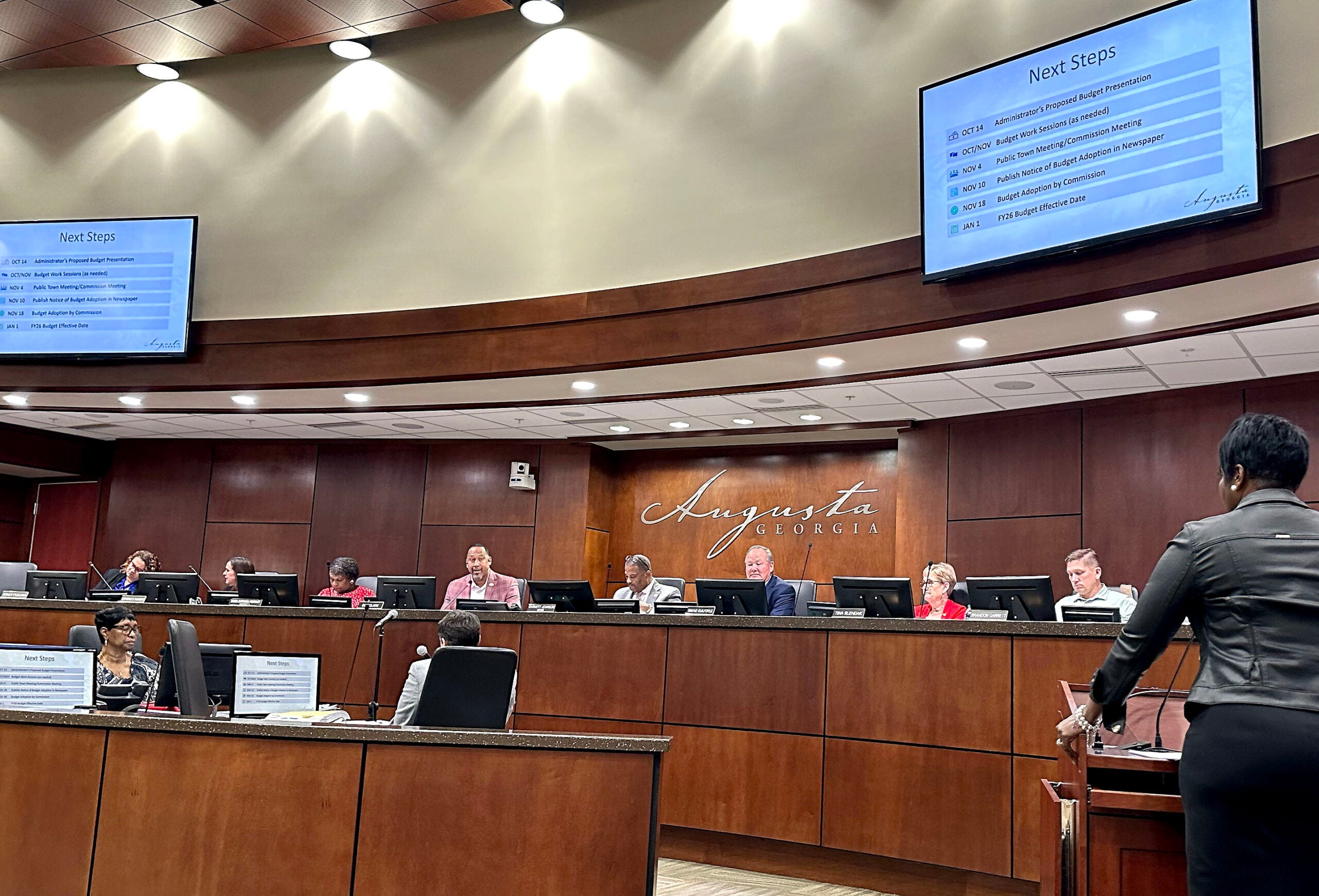A projected $21 million shortfall means the Augusta Commission faces tough choices as it finalizes the 2026 budget.
City Administrator Tameka Allen delivered the grim outlook Tuesday with a recommendation for a two-mill property tax increase.
“It brings me no pleasure to present this 2026 budget,” said Allen, who has warned of deficits from the expiration of pandemic relief funds. “We face an extremely tough year. It’s one of the toughest I have seen in my 33 years in this organization.”
Rising costs, limited revenue
Allen attributed the deficit to the loss of $7.4 million in American Rescue Plan Act funds, severe inflation, a 41% rise in employee healthcare costs since 2018 and the addition of 125 law enforcement officers last year, coupled with the commission’s years of adopting rollback millage rates.
Revenues lag costs. Annual property tax collections rose about $837,000 and car taxes by $636,000. Local option sales taxes increased by $5.3 million, but without ARPA funds general fund revenues will drop $4.6 million.
“Years of escalating costs and deferred revenue increases are finally catching public with us,” Allen said.
The shortfall includes $11.6 million in the general fund and $9.2 million in the law enforcement budget. “This did not arrive overnight,” Allen said. “We will not solve it all at once.”
The deficit was $26 million before analysts identified $5 million in savings, Allen said. The sheriff’s budget is rising by $5.7 million, with $2.6 million for last year’s pay plan and $2.6 million for added staff. The hiring erased $3.1 million in lapsed salary savings.
While Augusta’s total budget is $1.3 billion, Allen said most is locked into enterprise funds, sales tax projects and other preset spending. “Most of the time we are really talking about a small piece of that pie,” she said.
The commission controls about $223 million, 62% of which goes to elected officials, boards and external agencies.
READ MORE: MIS Committee approves moving forward with Columbia County Library System appointments
New costs and revenue options
Allen did not cite Augusta’s multimillion-dollar refund to the U.S. Treasury as a contributing expense. Major new expenses included:
- $5 million for employee healthcare
- $3.1 million for a 3% cost of living adjustment minus $1.5 million in lapsed salaries
- $1.5 million in prisoner costs
- $350,000 for a new vegetation and grounds department
- $1 million to rebuild the fund balance
- $841,360 for a new judge and accompanying staff
- $3.7 million for increased costs from fleet contracts, fuel, outsourced payroll and HR, and electricity
Allen’s plan calls for a two mill property tax increase that would raise $16 million while remaining two mills below the tax cap. The increase would be about $150 more per year on a $200,000 home. Other proposed steps include:
- 3% across the board cuts: $5.7 million
- Rightsizing Housing and Community Development: $500,000
- Rightsizing Richmond County Correctional Institution: $1 million
- Rightsizing transit: $1 million
- Reducing NGO and agency funding by $841,360 through a 30% cut to discretionary payments and 10% to authorities and mandated agencies
“We need to make sure we have what we need for our core functions before we provide funds to other agencies that are outside,” Allen said.
Other recommendations include a 0.42 mill increase for fire protection, a 0.7 mill increase for urban services fire, and a 5.5% water and sewer rate hike.
READ MORE: Columbia County Board of Education appoints Greenbrier assistant principal
Push for deeper cuts
Commissioner Don Clark urged a closer look at spending before raising taxes. “Before we do any further increases to property taxes or otherwise — before we continue mounting things on the back of the taxpayer — we need to take a harder hit at this,” he said.
Clark called for addressing a “culture of misconception” in which elected officials spend freely. Most residents are unaware of what Augusta spends on non government entities and “don’t even know we’re paying for,” he said.
Mayor Garnett Johnson said he has been “bombarded with complaints and concerns about garbage and streetlight fees” and urged more expense reductions .
READ MORE: FreshTake Grocery launching new fall festival
Insurance vote fails
To address rising employee health insurance costs, the commission is considering raising employee premiums and deductibles. Interim Finance Director Timothy Schroer recommended rate increases staggered by income and a deductible increase to $500 for hospital stays.
For an employee only, the increases ranged from $6.17 to $20.63 per pay period based on the plan, wellness compliance, and income.
The commission’s next budget work session is 2 p.m. Oct. 23. The budget adoption deadline is Nov. 18.











